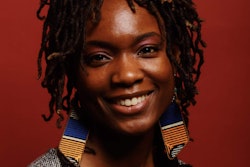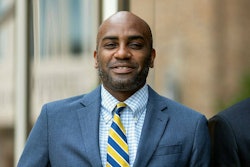Along with showcasing the world’s best athletes, the Olympics offer a unique glimpse into history and race relations.
When TV news images showed pro-Tibet sympathizers dramatically disrupting the international Olympic torch relay in multiple cities earlier this year, Dr. Yosay Wangdi’s faculty colleagues throughout academia flooded her with e-mails. “They wanted to know how my students were responding,” says Wangdi, an assistant professor of history at Grand Valley State University. “Over and over, they said their students were very passionate, very sympathetic to Tibet.”
With the eyes of the world focused on the Olympic Games in Beijing this month, Wangdi, who’s of Tibetan ancestry, expects to hear from colleagues again. She also expects her students this fall to continue discussing Tibet’s longstanding conflict with China, just as they did this past spring when news reports surfaced of a crackdown that sometimes turned violent against anti-Chinese demonstrators in Tibet.
For many Americans, TV and other media provide their only contact with the Olympics. Yet scholars who incorporate sports into their class lessons believe the broadcasts offer a unique glimpse into history and race relations. Indeed, the modern-day games are known as much for politics, civil rights, anti-apartheid, terrorism and boycotts as they are for seemingly superhuman sporting feats.
Dr. Peniel Joseph, an associate professor of African and Afro-American studies at Brandeis University, believes the social and political undercurrents surrounding Olympic history can teach college students lessons that supplement what’s covered in a classroom.
“Jesse Owens and his four gold medals are an example of citizenship and meritocracy,” Joseph says, referring to the U.S. track star who gained worldwide stature in the 1936 games in Berlin. “The Olympics show the global nature of sport. They’ve been ahead of the times in terms of race.”
However, academia can be slow, scholars say, to embrace Olympians of color who have been ostracized by society at large. In 2005, for instance, San Jose State University awarded honorary doctorates to former students John Carlos and Tommie Smith. Officials there dedicated a 20-foot-high sculpture on campus in the likenesses of Carlos and Smith in a Black power salute. The sculpture was commissioned in response to grassroots calls from students and faculty there wanting them recognized and honored for their nonviolent protest 37 years earlier. Smith and Carlos were SJSU students and members of the Olympic Project for Human Rights when they competed in the 1968 Olympics in Mexico City. There, Smith won the gold medal in the 200-meter dash, Carlos the bronze. But what they became known worldwide for, and shunned for years, was their action on the victory platform. During the award ceremony, Carlos and Smith, heads bowed, medals encircling their necks, stood with Australia’s silver medalist Peter Norman. Carlos and Smith each raised a clenched, dark-gloved fist toward the sky in silent protest of America’s civil rights failures. Photos of them were seen everywhere and quickly became among the most famous in Olympic history.
And as swiftly as the images were seen was the negative reaction to them. Many White Americans were outraged. Smith and Carlos were expelled from the athletes’ village and returned to this country in disgrace. But with passage of time can come understanding, and even pride and appreciation for what was once vilified. Dr. Richard Crepeau, professor of history at the University of Central Florida, says his students are typically conflicted and confused when learning about Smith’s and Carlos’ actions in 1968. Among other things, Crepeau teaches the history of sport in America as well as race and sports.
“To them, the 1960s were a strange and weird time,” he says, referring to his students. “They have an inability to relate to what was going on at the time. Their confusion is perfectly understandable because they weren’t alive in the ’60s, but they buy into the notion that sports and politics don’t mix.
“I try to get them talking about it,” Crepeau says. “I challenge them to see what they can’t see, get them to consider other points of view. After all, sports and politics get mixed all the time.”
His students are quick to criticize as an overreaction the decision of Olympic officials in 1968 to boot Carlos and Smith from the athletes’ village. Furthermore, he says, some of them steer class discussion back to the two men a week or two after the initial discussion to say they had searched their names on the Internet and were impressed that SJSU had invited both men, along with Norman, to the 2005 sculpture dedication. “It’s like an ‘aha!’ moment,” Crepeau says, adding that he finds their interest particularly gratifying because so many of his students are majoring in journalism or history, meaning they will likely become public opinion-makers and scholars in the not-toodistant future.
Joseph says that because so many of his students grew up participating in integrated sports teams and extracurricular activities, “they find it hard to believe how segregation really operated in the United States.”
Soon after a class discussion about the Black power movement, which included mention of the 1968 Olympics, one of his students purchased and read Smith’s autobiography, Silent Gesture. “The student was very upset about the injustice of the time,” Joseph says.
More recently, Carlos participated in one of the so-called human rights torch rallies held in this country protesting China’s human rights record, which includes harsh governance of Tibet in the past five decades. Clutching a torch in one hand and a U.S. flag in the other, Carlos led a stream of joggers down a six-kilometer route through downtown San Francisco in early April, according to published reports. This alternative run was held a few days before the official Olympic torch arrived in San Francisco for the only North American leg of the global relay. The protest, along with other human rights torch rallies in other cities, was among many events Wangdi and her students paid close attention to, through news reports.
As part of their coursework, students in Wangdi’s East Asian religions class, for instance, read the autobiography of the Dalai Lama, the exiled Tibetan spiritual leader. So they already were aware of China’s oppression of Tibet before the worldwide demonstrations related to the torch relay began.
“We don’t do China-bashing in class,” Wangdi says. “What is especially impressive is the maturity of students. When we discuss Tibet, they are sensitive in expressing their comments and opinions without offending their classmates.”
China has ruled Tibet since communist troops marched into the region in the 1950s. The Dalai Lama, who fled to India amid a failed uprising in Tibet in 1959, has advocated some form of autonomy to allow Tibetans to practice their culture and religion without persecution. This past March, antigovernment riots and protests in Tibet and Tibetan communities in western China sparked swift condemnation from national leaders and a police clampdown. Born and raised in India, Wangdi has never traveled to the land of her ancestry, nor does she have immediate family living there. But like many of Tibetan heritage, she chooses her words carefully during press interviews, not wanting to further jeopardize people remaining in Tibet. Yet her cautious demeanor doesn’t mask the interest she has in protests such as those tied to the Olympic torch relay. The relay transports a flame from Greece to the respective location of the games.
Crepeau says the worldwide demonstrations coinciding with the torch relay to Beijing gave him another opportunity to reinforce his lessons in class. “Students were commenting how the relay became political,” he says. “Then I threw in the fact that the origins of the relay actually resulted from politics.”
His students were taken aback to learn the relay, introduced as a lead-in to the 1936 games, was part of Adolph Hitler’s plan to promote Nazi ideas by suggesting ancient Greece was an Aryan forebear to the German Reich. “This took us back to the premise that sports and politics have been mixed for a long time,” Crepeau says.
But students accepted this, just as they accepted the stories of discrimination and hardship faced by Owens in this country, despite his Olympic accolades in Germany on the brink of World War II. The grandson of a slave, Owens overran the myth of the socalled master race. Yet back in America, he still had to sit in the back of buses. At a hotel where he was honored for his four gold medals, he was forced to use a freight elevator rather than the passenger elevator reserved for Whites.
“Nowadays, the top athlete winds up on the Wheaties cereal box,” Crepeau says, referring to the coveted endorsement contract. “My students haven’t thought about such hostility against Olympic winners, but once they consider the social period, the treatment of Jesse Owens is no longer something that shocks them.” He and other observers believe this year’s Olympics, which last until Aug. 24, could grow into one of the most politically charged in modern times. They agree there’s only one way to find out:
Let the games begin.
| See also, Hispanic Growth Not Reflected on U.S. Olympic Squad |
© Copyright 2005 by DiverseEducation.com















